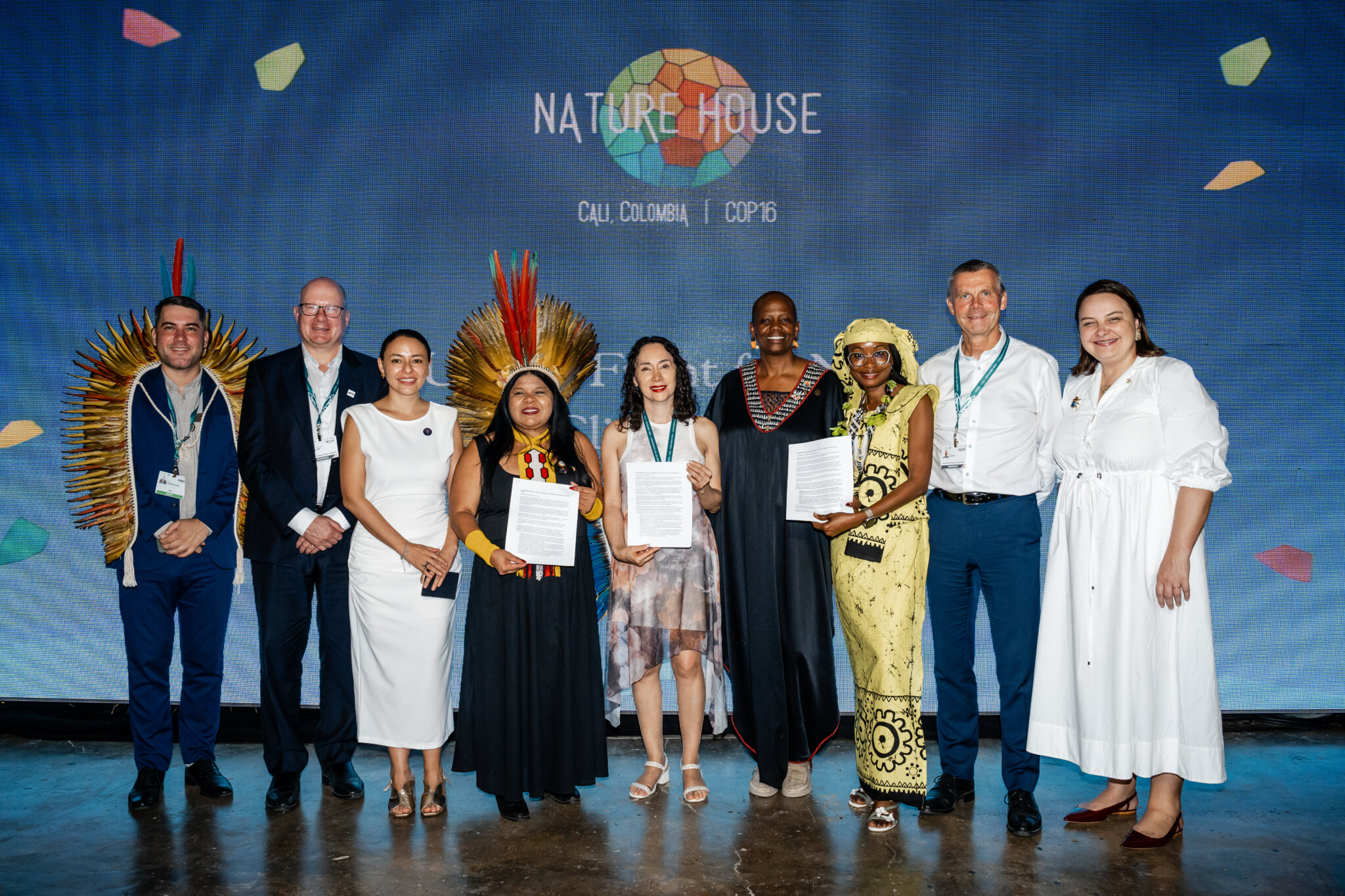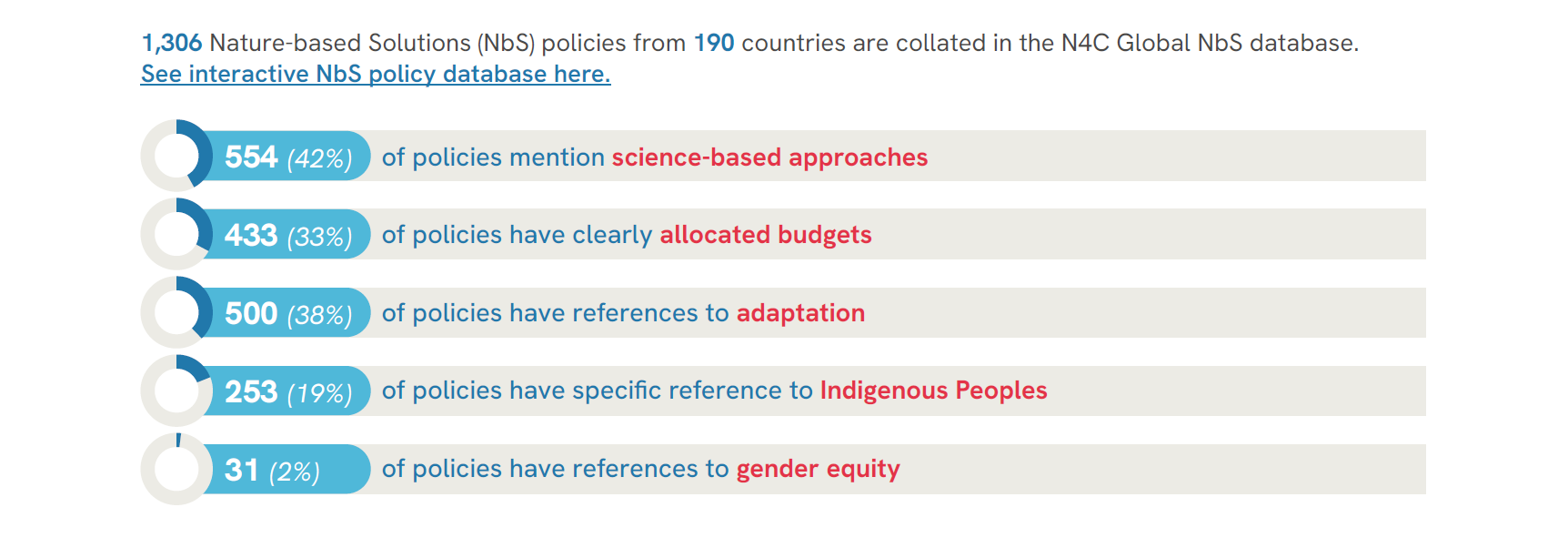Policy Tracker 2024: Only 33% of nature-related policies published since the Paris Agreement have allocated budgets
New research launched today from Nature4Climate reveals that while progress has been achieved, the gap between policy commitments and budget allocation for nature, food and climate action remains far too wide. Analysing over 1,300 policies from 190 countries, the fourth edition of the NbS Policy Tracker shows a growing trend of policies that align financial resources with climate and biodiversity goals. However, only one-third (33%) of nature-related policies published since the Paris Agreement have allocated budgets. Of the 300 new policies reviewed in 2024, four in ten (40%) mention budgets or financing for NbS.
The research from Nature4Climate also reveals that less than two in 10 (19%) of policies have specific references to Indigenous Peoples. Even fewer (0.46% or 6 policies) address Indigenous Peoples’ equity specifically, highlighting the significant lack of inclusion of Indigenous Peoples who are critical for people and nature. Indigenous Peoples manage 50% of the world’s land but receive less than 1% of climate funding. The GEF Global Biodiversity Framework Fund recommends at least 20% of public climate finance for nature-based projects should be directed to Indigenous Peoples and local communities.
James Lloyd, Nature4Climate Policy Lead, commented: “While we are seeing positive momentum in the adoption of NbS policies, new data reveals governments are not backing their political commitments with allocated budgets and largely overlooking Indigenous Peoples and Local Communities in their plans. This is a serious missed opportunity.”
Read more
Related articles for further reading
Nature-based solutions (NbS) are strategic and cost-effective for policymakers to address climate change, biodiversity loss, and land degradation while advancing sustainable development goals. However, NbS remains dramatically underfunded by governments at US$200 billion per year globally (finance flows to activities directly harming nature were more than 30 times larger). We need this to almost triple to US$542 billion per year by 2030 to meet the Rio Convention targets on limiting climate change and the Biodiversity Plan targets.
Key asks for policymakers:
- Create investable NDCs to mobilize private sector capital to close the climate finance gap. Currently, for every US$3 of public funding for climate change, we only see US$1 of private finance. The private sector must mobilize its resources to align the economy with our climate and nature goals.
- Responsibly develop carbon markets. To boost the Paris Agreement’s climate goals, countries need to finalize Article 6 with high-integrity rules and strong safeguards for people and nature. There is an opportunity to cooperate with other countries to harmonize rules to ensure both high integrity of carbon markets and make them easier for foreign investors to navigate.
- Increase direct, fit-for-purpose funding mechanisms for Indigenous Peoples, local communities, and sub-national governments, ensuring finance reaches communities on the ground. At least 20% of all public climate finance for nature-based projects and investments should be directed towards IPs and LCs, recognizing their role in the protection and restoration of nature and helping accelerate the transition to local nature-positive economies.
Accelerating action from COP to COP

An open letter was delivered at a high-level leaders’ reception in Cali to Minister Sonja Guajajara of Brazil and Ambassador Nohora Quintero of Colombia. Photo: Joe Short Photography
The interconnected crises of biodiversity loss, climate change, and desertification require unified solutions. The 2024 edition of the tracker was launched at UNCBD COP 16 in Cali, Colombia, alongside an open letter addressed to President Petro of Colombia and President Lula of Brazil. The letter is signed by more than 70 leaders—representing business, finance, civil society, and Indigenous communities—aiming to encourage and support the two Latin American countries in their leadership aligning nature and climate action, while placing the urgent transformation of food systems at the heart of efforts.
“As hosts of COP16 and COP30, Colombia and Brazil can forge a Latin American partnership that will guide the world by demonstrating the interconnectedness of climate and nature”, stated the signatories state in the letter
Notable letter signatories include former UNFCCC Executive Secretary Christiana Figueres, Chair of the Elders Mary Robinson, climate scientist Johan Rockström, as well as Indigenous leaders Juan Carlos Jintiach and Hindou Oumarou Ibrahim, business leaders from Natura, Danone, and Nestlé, finance leaders from Legal & General Group plc, Southbridge, PRI, and IIFCC, and civil society and NGO leaders from Instituto Talanoa, Transforma, Movilizatorio, and Nature4Climate.
>>>>>> READ THE LETTER AND THE FULL LIST OF SIGNATORIES
The signatories point to three priority areas for the two COP Presidents : 1) Strengthen national climate and biodiversity plans; 2) Scale up investment for nature and food systems transformation and 3) Support the full and effective participation of farmers, Indigenous Peoples and local communities across policy development, decision making and monitoring.
“Nature-based solutions are a vital, yet under-utilized strategy that offer a unique triple win for climate, people and biodiversity: reducing emissions, enhancing resilience, and protecting biodiversity. Governments must unlock critical funding to protect, manage and restore nature with close alignment and cooperation across the climate and nature agendas”, added James Lloyd.
Supported by the new research, the letter highlights the commitment to build on progress, accelerate action globally and work with governments to deliver a ‘year of united action on climate, nature and food’.
Policy Tracker Database:
The fourth edition of the NbS Policy Tracker, developed in partnership with Arboretica, provides the most comprehensive analysis to date of global nature-based solutions policies. The Tracker identifies and analyzes policies integrating NbS as a key mechanism for addressing climate and biodiversity challenges. The tracker covers 191 countries and examines English, French, Spanish, and Russian policies, utilizing artificial intelligence to analyze over two million online pages. The analysis captures over 1,300 policies, all enacted since the Paris Agreement.
The Tracker also showcases promising developments through case studies from eight countries, including Brazil’s integration of NbS into tourism planning, Canada’s incorporation of Indigenous rights into environmental protection, and Vietnam’s comprehensive water resource management approach.
The NbS Policy Tracker offers valuable insights for various sectors. Academics can leverage the data for research on the integration of NbS into national and regional policies, while NGOs can use it to identify effective policy models for advocacy and program development. Businesses can explore innovative NbS approaches that align with sustainability goals and investment opportunities.
READ MORE:
- The Nature Tech Directory: new database tracks 1,000 companies worldwide applying nature tech solutions
- The clock is ticking: finance sector deforestation action must now go mainstream
- Nature4Climate launches full version of its climate action platform naturebase
- How can nature tech help the private sector meet its climate and nature goals?
